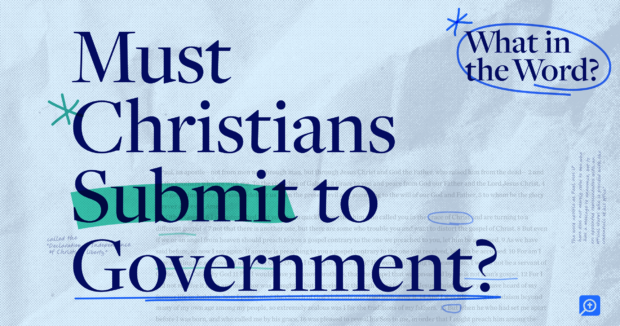In Romans 13:1–7, Paul tells Christians to undergo governing authorities, even calling these authorities “ministers of God.” However does this imply we should at all times submit? Or, if there are exceptions, what are they and the way do we all know? Kaitlyn Schiess joins Kirk E. Miller to speak about this much-debated textual content.
Observe the present on YouTube, Spotify, Apple Podcasts, and extra.


A Free E-book Only for You
Logos has given away over 5 million free books, empowering Christians globally to check deeply. Get a shiny, new free e book each month!


Unique Lexham Press Robust Texts Bundle
Have extra questions concerning the Bible? Get the 10-volume Lexham Press Robust Texts Bundle designed solely for followers of What within the Phrase?
Join with us
Prepared to extend your biblical literacy? Like and share. To go the additional mile, go away us a assessment in your most popular platform. See all of our episodes.
Subscribe to get future episodes. (Bonus: We’ll ship you a reduction to make use of in your first buy.)
Thanks for subscribing to Phrase by Phrase!
Use code WORDBYWORD to save lots of 10% in your first order.
WORDBYWORD
Copy code
Episode visitor: Kaitlyn Schiess
Kaitlyn Schiess is an writer, speaker, and perpetual theology scholar. She is the writer of The Ballot and the Bible (Brazos, 2023) and The Liturgy of Politics (IVP, 2020), and her writing has appeared in Christianity In the present day, The New York Instances, Christ and Pop Tradition, RELEVANT, and Sojourner. She is a co-host and senior editor of the Holy Submit podcast, and the host of Curiously, Kaitlyn. She has a ThM in systematic theology from Dallas Theological Seminary and is presently a doctoral scholar in theology at Duke Divinity Faculty.
Episode synopsis
Introducing Romans 13:1–7
In Romans, Paul transitions from doctrinal instructing (Rom 1–11) to sensible utility (Rom 12–16). In Romans 13:1–7, Paul shifts to discussing Christian ethics, notably as they relate to governing authorities. Paul instructs believers to undergo governing authorities, emphasizing that these authorities have been instituted by God and function his “ministers.”
Debate and key questions
This passage has been a topic of controversy as a consequence of differing interpretations and purposes, notably whether or not Paul’s command to submit is absolute or context-specific. One other key query issues learn how to decide exceptions to submission. Students and theologians provide a variety of interpretations, from those that see very restricted exceptions to those that argue for a lot looser utility of Paul’s directions.
Exploring historic context
Paul’s description of the authorities was formed by his context. Thus, Kaitlyn and Kirk discover the political panorama beneath Roman rule and the truth of persecution confronted by early Christians. Moreover, the talk about the benefaction system and the dynamics of political energy in that period. Paul means that governing authorities serve to reward good conduct. Nonetheless, as Kaitlyn shares, the historic expertise of persecution complicates the sensible utility of this passage.
Broader biblical theology
Kaitlyn and Kirk talk about different related passages, together with these from 1 Peter, Acts, and examples from the Outdated Testomony. Their dialogue contains references to Genesis and the creational mandate, together with its idea of presidency as a creational good.
Analyzing Paul’s theological reasoning
Paul’s directions in Romans 13 comprise each imperatives (instructions) and teachings. Understanding the imperatives requires cautious evaluation of their theological reasonings. As such, Kirk and Kaitlyn talk about the passage’s theological issues, together with God’s sovereignty over rulers and the connection between subjection and conscience.
Paul argues that governments operate as servants of God. Nonetheless, his language additionally implies sustaining a better allegiance to God, the one who institutes such human authorities as his servants. Kaitlyn additionally identifies the necessary distinction between submission and obedience.
Paul’s personal civil disobedience?
Notable disparities exist between Paul’s message in Romans 13 and his personal experiences. For example, Paul himself confronted persecution from governing “ministers.” Additionally, at occasions, as a substitute of submitting, he opposed and thwarted them.
This leads Kaitlyn and Kirk to look at the idea of applicable civil disobedience. They supply examples from church historical past that illustrate when and the way Christians have resisted unjust authority.
Gospel transformation
The dialogue connects Romans 13 to the previous themes from Romans 12, which spotlight the transformation introduced by the gospel. This gospel transformation (Rom 12) has important implications for Christian citizenship and the correct response to governments (Rom 13).
Sensible instructing suggestions
Kirk and Kaitlyn conclude by providing strategies on learn how to educate and apply the passage as we speak. They encourage listeners to be taught from the church’s historic struggles and from completely different cultural views within the world church. They encourage preachers and academics to emphasise the passage’s broad theological rules and to adapt it to deal with their particular viewers.
In addition they requires consistency in making use of the decision to submit. Kirk and Kaitlyn warn towards a selective obedience that aligns solely with one’s private preferences. They spotlight the significance of group discernment in decoding Scripture.
Books by Kaitlyn Schiess
Kirk’s advisable sources on Romans
Source link














